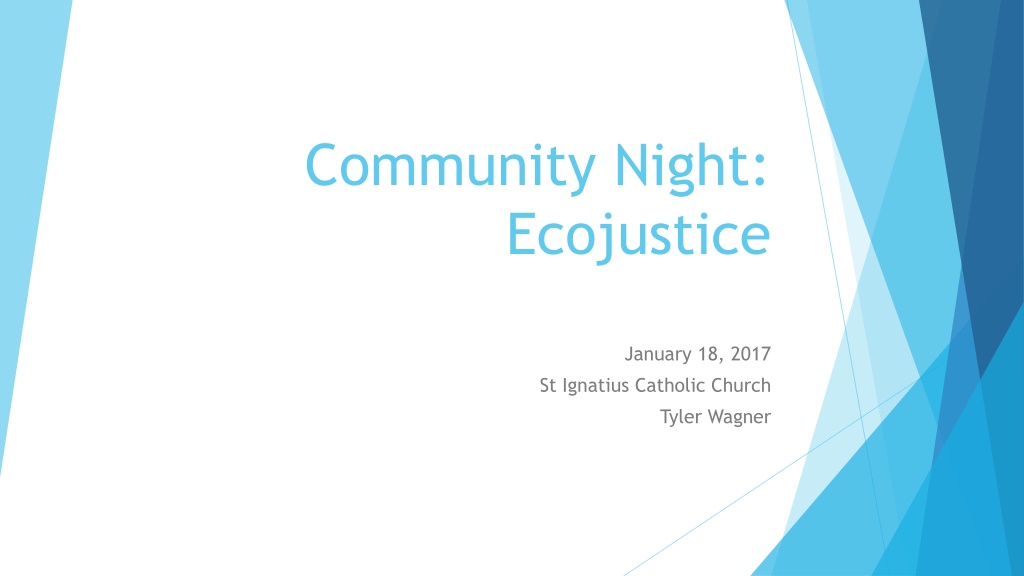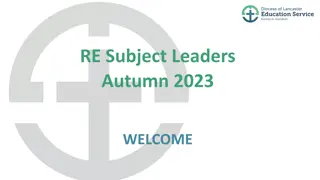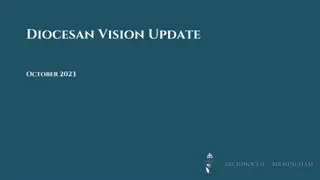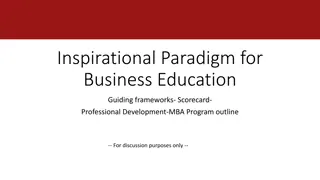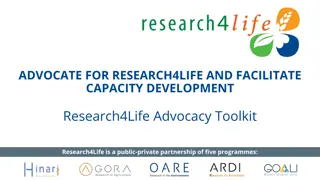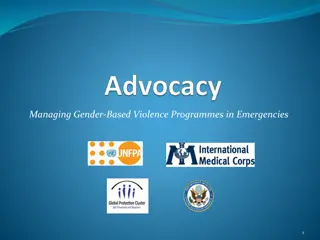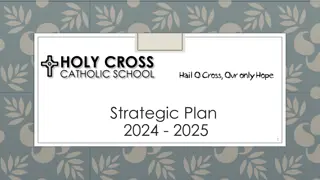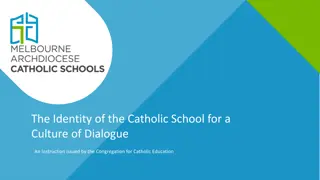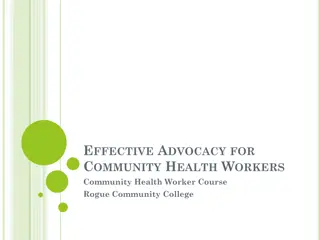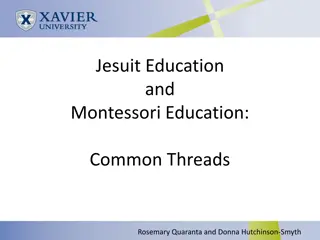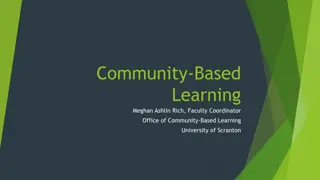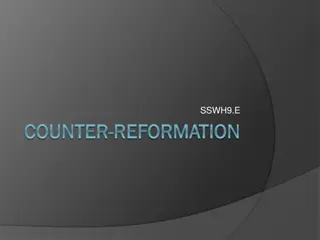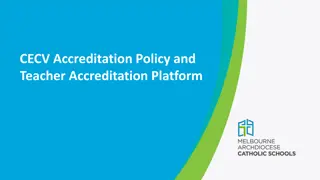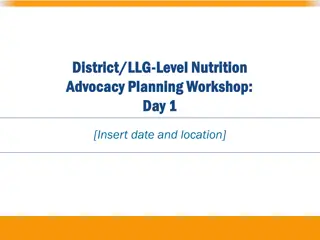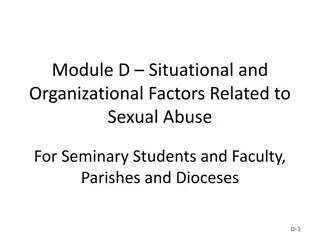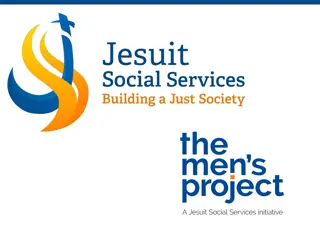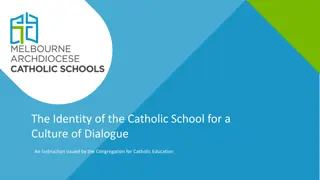Ecojustice and Advocacy in Catholic and Jesuit Contexts
Explore the intersection of ecojustice, advocacy, and Catholic teachings through a series of events and discussions rooted in scripture and Jesuit values. Discover the mission of the Jesuit West Province and how it aims to address social and environmental justice issues through a holistic approach. Learn about the importance of reconciliation with God, one another, and creation, and the role of advocacy in addressing systemic root causes of injustice.
Download Presentation

Please find below an Image/Link to download the presentation.
The content on the website is provided AS IS for your information and personal use only. It may not be sold, licensed, or shared on other websites without obtaining consent from the author. Download presentation by click this link. If you encounter any issues during the download, it is possible that the publisher has removed the file from their server.
E N D
Presentation Transcript
Community Night: Ecojustice January 18, 2017 St Ignatius Catholic Church Tyler Wagner
Agenda Rooting the conversation in our Catholic and Jesuit Identity What we have done so far How can we best move forward from here?
Scripture The Lord God then took the man and settled him in the garden of Eden, to cultivate and care for it. - Genesis 2:15 You shall love the Lord, your God, with all your heart, with all your soul, and with all your mind. Matthew 22:37 You shall love your neighbor as yourself Matthew 22:39 We see from scripture the importance of our loving relationships with God, our neighbors and creation
Jesuit West Province Mission Oregon and California provinces are combining, this is the stated mission of the new Jesuit West province (divisions and bolding are mine to emphasize the connection to advocacy and ecojustice) Through educational, pastoral, social ministries, we invite all people to experience the transformative force of God s love, empowering them to image and create the economic, political, social and ecclesial structures that more effectively reflect God s love and compassion for all creation.
Jesuit West Province An integrated approach to ending extreme poverty, promoting the dignity of the poor and excluded, welcoming migrants and caring for the earth, our common home. Themes of Catholic Social Teaching Discerning and responding to the most challenging issues of the times From 2 of the 7 values from the same Jesuit West mission/vision/values. First connects so much to goals of ecojustice work. Second will come back around when we get to St. Ignatius Parish s mission
From Decree 1 released after the recently concluded General Congregation 36 General Congregation 36 Connects back to our Scripture passages about relationships with God, neighbor and creation and the need to heal those relationships Discerned three most important calls today reconciliation with God, with one another, and with creation, ... This reconciliation is always a work of justice, a justice discerned and enacted in local communities and contexts Environmental and social justice issues are closely linked and flow from flawed systems Multifaceted responses are necessary including adopting behavior coherent with our desire for reconciliation with creation and working to accompany and remain close to the most vulnerable. Because these issues are systemic issues, we need to engage in justice work that addresses root causes and advocacy is a key way to do that work
Laudato Si and Pope Francis So what (we) all need is an ecological conversion , whereby the effects of (our) encounter with Jesus Christ become evident in (our) relationship with the world around (us). Living our vocation to be protectors of God s handiwork is essential to a life of virtue; it is not an optional or a secondary aspect of our Christian experience. Pope Francis, Laudato Si (217) It is a challenge but it is a loving challenge. It is essential, not optional, or secondary but it is in relation to our encounter with Jesus and our relationship with the world around us which you remember from the Scripture passages, and are about love. So we are challenged and invited into a loving change of our hearts, a loving conversion.
Call to Faithful Citizenship Call to Family, Community and Participation as a Theme of Catholic Social Teaching In the Catholic Tradition, responsible citizenship is a virtue, and participation in political life is a moral obligation. This obligation is rooted in our baptismal commitment to follow Jesus Christ and to bear Christian witness in all we do. As the Catechism of the Catholic Church reminds us, It is necessary that all participate, each according to their position and role, in promoting the common good. from the USCCB website One of the USCCB s 7 themes of Catholic Social Teaching and really calls us into active political participation for the common good
St. Ignatius Vision and Mission Our Vision - To be Oregon s spiritual home for Jesuit works. Our Mission - As Oregon s Jesuit parish, we are a welcoming Catholic community, challenged to discern the urgent call of Jesus in our times. With all of that context of the Catholic and Jesuit basis for advocacy around ecojustice (with ecojustice being the care of the earth and the poor and vulnerable), we are called at St. Ignatius in line with our mission to respond to that urgent call
What we have done thus far Year of Discernment Eco-conversion and Formation Laudato Si presentations, Lenten reflection groups, Active Hope retreat, Faithful Citizenship, Ecochallenge, Ecojustice alcove Eco-outings Depave, Mt. Tabor Ivy removal, Friends of Trees, Snowshoeing School Connection Composting, Sweater Fashion Show Reducing Consumption - Reusable dishware, reduction of energy use in Parish office Engagement in the community Eco-action spotlight, Petition St. Ignatius Fellow
Upcoming Opportunities Ecojustice advocacy Interfaith Advocacy Day New Lenten discussion groups, local immersions and retreats More eco-outings Documentary and discussion
How do we take the next step? What are the next steps? Really keep these 4 themes in mind whichever route of advocacy we take, I think these are 4 essential steps We have been working through faith formation and education (which we will be continuing) and it has been preparing us - in one way for advocacy -as the way to get at the root structures and working together as a community as the best way to raise up our voices to be heard and to make a difference. Education Continuing the Eco-conversion and formation Building Relationships, Building Community Advocacy During the Year of Discernment, we imagined possibilities for working for justice together as a community. This presentation is getting at a similar idea -- offering concrete possibilities to spark the community s imagination around ecological justice advocacy and then creating space to share ideas on what it could look like for us to share in this work together. Since advocacy is a growing edge for our parish s ecojustice work, it will be really valuable for us to imagine these possibilities together.
Keep Fossil Fuel in the Ground in Solidarity with the Most Affected Communities Why is this important There are 5x more fossil fuel reserves than we can burn to reasonably stay below 2 degrees C. 2 degrees is an unsafe point for people and the planet. 350.org, 350PDX
Keep Fossil Fuel in the Ground in Solidarity with the Most Affected Communities Connection to our Faith Affected communities are often vulnerable communities such as Indigenous people, low income communities and communities of color and the most affected by climate change and the people who have contributed to it the least We are called to stand in Solidarity (Catholic Social Teaching) Solidarity is not a feeling of vague compassion or shallow distress at the misfortunes of so many people, both near and far. On the contrary, it is a firm and persevering determination to commit oneself to the common good; that is to say, to the good of all and of each individual, because we are all really responsible for all. On Social Concern (Sollicitudo rei Socialis. . . ), (38) Pope Saint John Paul II 350.org, 350PDX
Keep Fossil Fuel in the Ground in Solidarity with the Most Affected Communities What can we do: Educate ourselves about the major projects in Oregon and the Pacific Northwest Build relationships with organizations and people engaged in this work Make our voices heard through: Letter writing campaigns to elected officials Public testimony at public hearings Petition signing Phone calls to elected officials Community gathering at marches and other events 350.org, 350PDX
Transition to a Just, Renewable Economy Why is this important? Cannot keep burning fossil fuels, but we need a replacement form of energy Renewable energy and a green economy offer great opportunities for job creation Portland and Oregon are preparing energy policy for 2017 so this is timely
Transition to a Just, Renewable Economy Connection to our Faith There is an urgent need to develop policies so that, in the next few years, the emission of carbon dioxide and other highly polluting gases can be drastically reduced, for example, substituting for fossil fuels and developing sources of renewable energy. Laudato Si (26) Opportunity for new jobs Dignity of Work and the Worker Adding our voice to work for equity Preferential Option for the Poor and Vulnerable
Transition to a Just, Renewable Economy How can we get involved? Educate ourselves about a transition to a renewable energy in Portland and Oregon Build relationships with participating organizations and coalitions like 350PDX, Renew Oregon and Oregon Interfaith Power and Light Join as a community to switch to getting our energy from renewable sources Prepare to help support initiative to help weatherize and solarize Portland homes and businesses
Transportation for Oregon's Future Why is this important? Puts people to work designing, building, and operating sustainable transportation options. Enhances social equity by providing a variety of affordable and efficient transportation options for everyone Supports development and land use patterns that make it easier for people to drive less. Improves the environment by reducing greenhouse gas emissions and other harmful pollution. OPAL
Transportation for Oregon's Future Connection to our faith OPAL is a Catholic Campaign for Human Development grant recipient Care for creation through reduction of greenhouse gas emissions Supports equity through increased affordable transportation options OPAL
Transportation for Oregon's Future How can we get involved? Participate in First Saturday of the Month organizing with "Bus Riders Unite!" (a project of OPAL) Educate ourselves and partner with organizations such as OPAL Submit a letter to the editor or author an opinion column for submission to a newspaper Testify at a public hearing Activate the parish in support of transportation options OPAL
Cleaner Air Oregon Why is this important? Air toxins discovered in SE and N Portland in 2016 The goal is to create new, permanent air quality rules for Oregon by the end of 2017. According to EPA s National Air Toxics Assessment, Oregon has the third largest population at risk of excess cancer due to air pollution behind only California & New York. Over 300,000 adult Oregonians and 83,000 children have asthma, putting Oregon in the top five states with the highest percentage of adults (10%) with asthma
Cleaner Air Oregon Importance to our faith Clean air for the poor and vulnerable, such as children and the elderly Care for Creation as the air is one part of God s gift and to contaminate the earth s waters, its land, its air, and its life these are sins. For to commit a crime against the natural world is a sin against ourselves and a sin against God. Laudato Si
Cleaner Air Oregon How we can get involved Partner with NCA to host a house party or parish gathering to talk about local air pollution and what we and our neighbors can do to work for clean safe air. Participate in the Public Notice and Comment Period for the Cleaner Air Oregon Rulemaking (May - July 2017) Participate in a rally for Clean Air Attend workshops like, "DIESEL + DINNER, A POLLUTION SOLUTION WORKSHOP IN NE PORTLAND" Contact legislators to advocate support for the implementation of Cleaner Air Oregon
World Caf Questions Of the advocacy opportunities presented, do any stand out as potential areas for our Parish to advocate for as a community? How are you called to be a leader and/or an engaged participant on joining with Parish advocacy opportunities? Keep Fossil Fuels in the Ground and stand in Solidarity with Affected Communities Transition to a Just Renewable Economy Transportation for Oregon s Future Cleaner Air for Oregon
